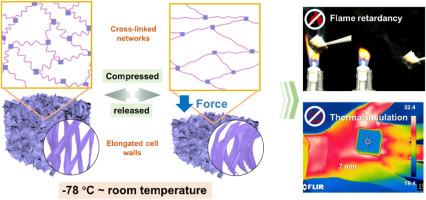具有超强弹性的阻燃隔热生物质气凝胶
IF 12.7
1区 材料科学
Q1 ENGINEERING, MULTIDISCIPLINARY
引用次数: 0
摘要
具有弹性和阻燃性能的生物质气凝胶作为化石基隔热材料的替代品具有巨大潜力。然而,弹性生物质气凝胶的功能性应用却因其较差的弹性持久性而受到阻碍,尤其是在低温条件下。在此,我们提出了一种协同策略,通过对生物质气凝胶微观结构的战略性操纵和化学交联网络的实施,设计出在宽温度范围(从 150 ℃ 到 -78 ℃)内具有优异弹性的生物质气凝胶。即使在应变为 60% 的情况下进行 1000 次加载-卸载循环,气凝胶的塑性变形也仅为 6.1%,表现出超弹性性能。此外,气凝胶的结构和韧性即使在低温(-78 °C)条件下也能保持良好。由于构建了牢固的交联网络和具有拉长细胞壁的松散微结构,最大限度地减少了塑性变形和弯曲应力,从而抑制了结构破坏。此外,所制备的生物质气凝胶还具有轻质、阻燃(极限氧指数为 29%)、隔热(32.8 mW m-1 K-1)和红外隐身等一系列显著的优点。这项研究为设计具有优异综合性能的弹性生物质气凝胶提供了新的思路。本文章由计算机程序翻译,如有差异,请以英文原文为准。

Flame-retardant and thermal insulating biomass aerogel with super-elasticity
Biomass aerogels possessing both resilience and flame retardance exhibit great potential as alternatives to fossil-based thermal insulators. Nevertheless, the functional applications of elastic biomass aerogels are impeded by their poor resilience persistence, especially at low temperatures. Herein, a synergetic strategy was proposed for designing biomass aerogels with exceptional elasticity across a broad temperature range (from 150 °C to −78 °C), by strategically manipulating their microstructure and implementing a chemically cross-linked network. The resultant aerogels suffered from slight plastic deformation of only 6.1 % even after 1000 loading-unloading cycles at a strain of 60 %, manifesting super-elastic performance. Additionally, the structure and resilience of aerogel can be well maintained even under frigid temperatures (−78 °C). Because firmly cross-linked networks and loosely packed microstructures with elongated cell walls were constructed to minimize plastic deformation and bending stress, thereby suppressing structural destruction. Furthermore, the resulting biomass aerogel exhibited a remarkable combination of advantageous properties including lightweight, flame retardance (limiting oxygen index of 29 %), thermal insulation (32.8 mW m−1 K−1) and infrared stealth. This research offers new insights into the design of elastic biomass aerogels with exceptional overall performance.
求助全文
通过发布文献求助,成功后即可免费获取论文全文。
去求助
来源期刊

Composites Part B: Engineering
工程技术-材料科学:复合
CiteScore
24.40
自引率
11.50%
发文量
784
审稿时长
21 days
期刊介绍:
Composites Part B: Engineering is a journal that publishes impactful research of high quality on composite materials. This research is supported by fundamental mechanics and materials science and engineering approaches. The targeted research can cover a wide range of length scales, ranging from nano to micro and meso, and even to the full product and structure level. The journal specifically focuses on engineering applications that involve high performance composites. These applications can range from low volume and high cost to high volume and low cost composite development.
The main goal of the journal is to provide a platform for the prompt publication of original and high quality research. The emphasis is on design, development, modeling, validation, and manufacturing of engineering details and concepts. The journal welcomes both basic research papers and proposals for review articles. Authors are encouraged to address challenges across various application areas. These areas include, but are not limited to, aerospace, automotive, and other surface transportation. The journal also covers energy-related applications, with a focus on renewable energy. Other application areas include infrastructure, off-shore and maritime projects, health care technology, and recreational products.
 求助内容:
求助内容: 应助结果提醒方式:
应助结果提醒方式:


